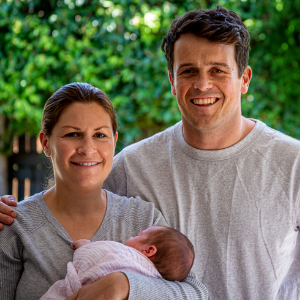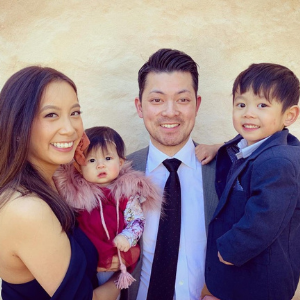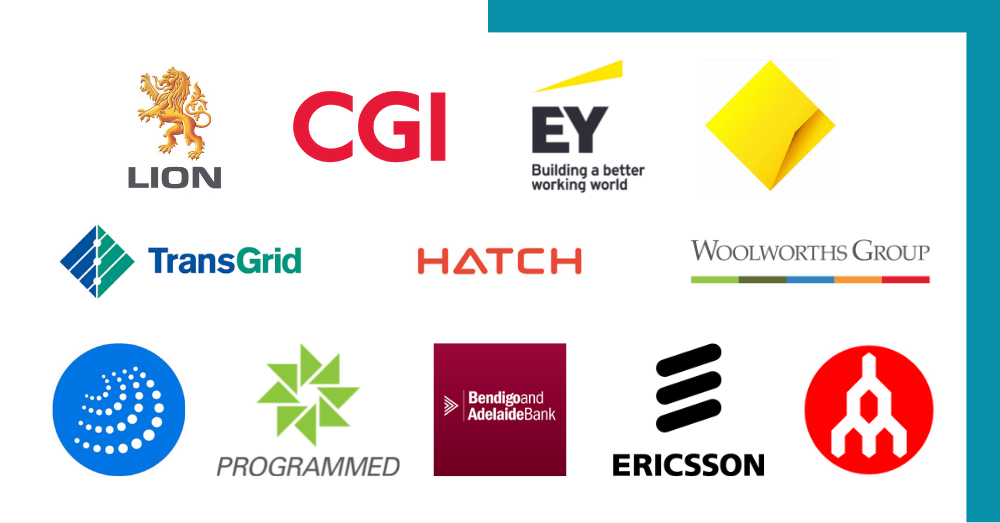On average, a woman in the U.S. will dedicate 12 more hours per week to unpaid work than a man. And according to IWR, this unequal distribution is set to increase if they become a mother: “most caregivers who reduce their hours at work or step out of the paid labor force altogether are women”. The result: a negative impact on women’s ability to return or participate fully in paid employment. A solution: gender-neutral paid parental leave.
Unsurprisingly, gender-neutral parental leave is a policy embraced by many of WORK180’s Endorsed Employers For All Women, and it’s having a powerfully positive impact on the home and work lives of their employees. How so? That’s exactly what we asked the real-life employees in this article…
What is unpaid work?
Unpaid work refers to the different forms of domestic work that do not receive remuneration. Examples of unpaid work include taking care of children, elderly or ill family members, and general household tasks such as cooking and cleaning. The ‘mental load’ — which refers to the invisible elements of running a household or raising a family — is increasingly considered part of this unpaid work.
What is a gender-neutral parental leave policy?
A company’s parental leave policy states the support they provide to their employees as they transition and adapt to the arrival of a new child. Traditionally, this policy offers varying support for the mother or father of a child (known as ‘maternity leave’ and ‘paternity leave’, respectively). These policies have often assumed women as the primary caregiver — perpetuating an archaic stereotype that continues to damage more than just the careers of women — and fail to include and/or meet the needs of many employees.
In contrast, a gender-neutral parental leave policy offers parental leave support to the primary caregiver — regardless of gender. The best practice even extends equal support to both primary and secondary carers. And ‘neutral parental leave policies’ extend this support to all parents, such as families that adopt, foster, de facto parents, and surrogacy arrangements. The most progressive policies also recognize kingship and former spouses and extend the policy to those who experience stillbirth.
Top tip: Job seekers using the WORK180 job board to find their next role can see the parental leave policy of our Endorsed Employers before they even apply!

Companies supporting shared responsibility
The positive impact on the home and work lives told through the real-life employees’ voices.

“I took six weeks off when my daughter was born. Of course you never know when they will arrive but work was very supportive and understanding of this. We had the handover plan in place ready to go any day. I had a lot of long service leave to take and decided to use this to work part-time for the rest of 2020. This meant I could spend more time with my four-year-old son, whilst my partner concentrated on our newborn. It also gave me time to do the housework on a Friday so that the weekend was saved for family time. This worked so well that I have continued to work part-time in 2021.”
Juan Palma | Solutions Architect, CGI

“Lion’s Family policy is about an opportunity to have that special time with my daughter, but also to help my wife go back to her career – it’s one of the most progressive I know of and it truly gives dads the opportunity to equally participate in being a parent. In the modern world, parenting is a real team effort and Lion supported me to smoothly manage the transition to primary carer and then back to the office.”
Jono Willis | General Counsel, Lion

“Programmed’s gender neutral parental leave policy allows primary carers to access to 12 paid weeks and flex work arrangements. This has given many of us an invaluable opportunity to spend quality time with our families. In fact, we have had over 100 men employees take parental leave when they became the primary carer, allowing them to assume the primary parenting responsibilities when their partner transitions back to work.
Personally speaking, without my husband being able to access flexible work practices, I simply would not be in a position to continue my career and be the mother I want to be to Harriet. That is why I am so proud that at Programmed we are able to support fathers within our workplace who can then in turn support their partners at home. This gives everyone the freedom to be able to make choices about progressing their own career journey.”
Anna Bagley | Group General Manager Risk & Legal at Programmed

“I took four weeks of parental leave as a secondary carer to spend time with my newborn daughter and support my wife in those early weeks. When Penelope was around nine months old, my wife returned to work and I took over primary caring responsibilities for her and that entitled me to another eight weeks’ leave.
Previously, someone in my position would’ve received two weeks’ leave to spend with their child in total, so there’s been a huge shift in the way CommBank regards fathers’ parental leave and its benefits. We’re expecting our second child soon, and I can’t wait to make the most of my parental leave.”
Greg Sarlas | Strategic Engagement Manager, Commonwealth Bank

Bendigo and Adelaide Bank: Jordan Clarke is a carer for his daughter Ester, who has several conditions and requires 24/7 care. Here’s his advice for other working carers:
“Ask for help. Bendigo and Adelaide Bank has supported me from the get-go; if I didn’t have such a supportive employer, we would not be in such a good position as we are now.”

The parental leave policy helped me to spend time with the family and allowed my partner to go back to work knowing the kids were in safe hands. Working flexibly – in hours and day – allows me to balance work with family duties, my wife’s start-up and connect with the kids much more.
Freek Jorna | Associate Partner, Bain & Company

“I come from an industry that historically has not valued the man caregiver role the way it does now (this would be true of many industries). When I reflect, I certainly see that there were times I got too emotionally and physically absorbed in my career and this was a norm for men in the businesses I worked for. I am very conscious of this and have worked hard to correct the imbalance whilst my boys are still young – I feel lucky to have had this realization. Having said that, I think times are absolutely changing and it has never been a better time to be a working father in terms of the acceptance in the workplace and our ability to get a better career and care balance.
It’s such a cliché, but the years with your children go so quickly. The only time you have is the now, so keep challenging yourself to be present for your family. There is no magic balance – you will never have enough time to spend on everything you want to, so it’s about the quality of the time you put into all of the ‘buckets’ of your life.”
Adam Mitchell | General Manager – FoodCo, Woolworths Group

“I took “Share the Care” leave, becoming a full-time carer to my son when my wife returned to work from parental leave. Now we both work part-time, and share the care for our son equally while building our relationship on being equal partners in everything, being equal partners in parenting and having equal impact on taking time off our careers. It keeps our relationship strong by supporting one another.
It’s the best thing I’ve ever done, easily one of the best decisions I’ve ever made. I’ve gotten to know and bond with my child in a way that I wouldn’t have without being his full-time carer. You only get the time when your children are young once, and you can’t put a price on the chance to bond with them, and I am so glad I did it. It’s a really great thing TransGrid offers. My advice? Just do it!”
Li-Wen Yip | Innovation and New Technology Manager, TransGrid
I’ve been really thrilled to see the rigid expectations of parenting change over the last decade. Rather than having a clearly defined ‘primary’ parent, we’re seeing more often that both parents want to have more flexibility. Sometimes this means having fulfilling (paid) work roles, and also being active, hands-on parents.
For us (South East Water), the changes we made to our parental leave offering means we are supporting our people to have options. For them to decide how they care and how they work to ultimately land on an outcome that is best for their family unit, whatever that looks like.
From the 28 employees who have accessed the enhanced leave since the policy was introduced, it’s been really interesting seeing the different ways they’ve chosen to use that leave — whether it’s upfront, in blocks, or later in the period in order to support their partners returning to work.
Bridget Thakrar | General Manager People and Safety, South East Water

Bendigo and Adelaide Bank: David Angus took 10 weeks of paid parental leave on two occasions to be the primary carer of his children. Here’s what David had to say about this experience:
“It was really important to me and my family. We have very limited family support as Claire’s family lives interstate and my family lives on a farm. This made the transition back to full-time work much easier for Claire (my wife).”

“I’m a staunch advocate for primary caregiving being equal. Through Lion’s flexible work policy I enjoyed taking three months leave to be a full-time carer for both my girls and worked four days a week for a time. I think it’s really important to show my daughters fairness and equality in the running of all household decisions and activities.
Promoting the acceptable standard of fairness and equality isn’t a big ask. We need to show leadership and influence men colleagues and peers to do the same. It is up to men to understand and consider the impact of male privilege, and the key issues women face in the workplace and more broadly in society.”
Tom Bills | National Brand Partnerships Leader, Lion
“Hatch’s paid parental leave and other lifestyle policies have helped promote shared responsibility in our household and have supported the mutual and respective parental behaviors, commitments and roles that my wife and I share. Non-work time is absolutely balanced between us. Our kids see us both contributing to the household. My wife and I naturally play to our strengths. We’re also focused on the key inter-relationships between all four of us, e.g. Dad-daughter time, Mum-children time, etc.
The ability to work from home has to an extent been practicable in enabling me to switch between work and family time readily. For example, dinner time is special. When I’m working from home, I am able to break from work at the kids’ dinner time – sitting at the table, no devices, talking about our day all together.”
Jeremy Parsons | Commercial Manager, Hatch

“I work in a role that requires frequent travel and having a company like Megaport that supports flexible working arrangements is really valuable to me as a father. When I’m not traveling, being able to work from home means I can be increasingly present and active in the lives of my two boys (who are one and six years old). It’s really important to me that I work for a company that supports and encourages me to be active and engaged as a father so that I’m able to maintain a healthy balance between work and family life. For instance, to have the flexibility to be able to attend a school assembly to watch my son receive a merit award and see him beam with pride with his family there to support him is great because these are the moments that you can’t replace.”
Damian Matacz | Head of Network Strategy, Megaport

“In preparation to return from parental leave in 2020, I spoke with my line manager about my return to work plan and whether it would be possible to return to the compressed hours format, working longer hours four days per week of work instead of five days standard days. What could have been an intimidating conversation was actually a welcomed discussion. This allowed me to have an extra day with my daughter each week keeping her home from Day Care, whilst I was able to maintain my full-time employment status.
Whilst this new way of working has not been without its challenges, I have a great relationship with my line manager and our leadership team who are open and supportive to talk through any challenges with a focus on making this arrangement work ongoing.”
Jess Loader | Category Manager, Woolworths Group

Bendigo and Adelaide Bank: Brad Gould took three months of parental leave to be the primary carer to his son, Hugo — an important step encouraged by his workplace but, unfortunately, still not understood by everyone:
“Some individuals questioned my commitment to my career and if I was going to return to my role. These types of views and questions are what women have always had to face, and experiencing it firsthand has given me a great insight into the challenges parents face when having to decide on having another child and take time off to care for that baby, or pressure to return to work after having a baby.”

“When I first needed to apply for parental leave back in 2017 I was admittedly apprehensive to ask about it. In the end, I was overwhelmingly pleased with the support I received from my colleagues and more importantly all Partners in the firm that I discussed this with.
It’s now become the “norm” in our office for dads to take up the parental leave benefit and have their time to be the primary carer whilst their partner gets a “break” and goes back to full-time work. In fact, it’s not only celebrated, embraced, and encouraged, but my experience in recent years is that it’s almost assumed that dads will be taking it.
Separate from the formal parental leave period however, it has been important for my family’s and my own well-being to work flexibly on an informal basis. I prefer — and sometimes need — to work a bit later than normal, so I’ll generally start my working day later than most, so I spend that extra time at home helping my wife.”
Julian Tai | Director at EY Australia

“Since my daughter was born in August, I’ve been empowered to work flexibly taking Wednesdays off as “daddy-daughter day” and soon, when my partner returns to work, I’ll be taking time off as a primary carer only working two days a week.
While companies need to provide these opportunities, I encourage men everywhere to demand them and take them when available. I’ve loved being part of the journey at Lion over the past seven years in promoting gender equality – from closing our gender pay gap in 2016 to our latest policy updates, we’re always looking to do the right thing and empower our people to do the same.”
Clint Williams | Talent Acquisition Leader, Lion

“My wife went back to work 10 months after giving birth, and so began my three months in the hot seat as my son’s full-time carer. And what a three months they were! I got to spend loads of quality time with my son, and watch him transform from a relatively stationary, relaxed bub into an energetic, adventurous and infinitely curious toddler. Not only did my time on parental leave provide many great experiences and memories, it also delivered an important dose of reality – I learned pretty quickly that being a full-time carer is no mean feat!”
Rory O’Connor | Executive Manager, Communications Business and Private Banking, Commonwealth Bank
“I work part-time hours and am also homeschooling two young children. I have struck a nice balance by working every day doing bits and pieces wherever possible (even on weekends). So rather than doing three long days, I’m chipping away every day. That’s the beauty of working remotely. You can make your work fit into your life — whether that may mean doing work as soon as you rise, or at night once the kids are in bed. I am finding the flexibility amazing!”
Cara Cochrane | Communications Manager, Woolworths Group

Bendigo and Adelaide Bank: Julian Lake took parental leave, an experience that proved invaluable to his family:
“I learned more about my partner, gaining an understanding of the magnitude of what it takes to be a stay-at-home parent was a serious reality check; I thought I knew, but I didn’t. To any parent who commits to their family full-time, or part-time, juggling a business or work, I take my hat off to you. The time was also important for my wife to have more of a balance in her life. It’s something we’ve managed to maintain.”

“I recently took parental leave and did so on the basis of Ericsson’s policy of 20 weeks’ paid leave as the primary caregiver. Working as a leader in a male-dominated industry, how I can help contribute to breaking down the barriers of gender inequality is always at the forefront of my mind. During the pregnancy of my second child, I wanted to take the opportunity to help support my wife in getting back to her work as a doctor sooner. Together, we made the decision that I would be the primary carer for our two children under two, enabling her to get back to work.
This decision was made clearer when the COVID-19 pandemic started and her work as a GP became even more critical in our community. After speaking with our People team, they highlighted that parental leave is 100% equal to both women and men in our company, provided they are the primary carer. The process to take the leave was very simple and straightforward, and I had one of the most rewarding five months of my life looking after my two children while supporting my wife’s return to work during such an important time for our community. I hope that by sharing my positive experience, I am encouraging more men to explore being a primary carer for a new child and doing my bit in bringing gender equality to our society.”
Kosta Tami | ANZA Engineering Integration Manager, Ericsson
“Due to COVID-19 I began working from home full time from March 2020. Shortly after that we were asked to keep the kids home from school. We have four little boys under the age of ten, three of whom are in school. I’m not going to lie, juggling my work commitments with my family life during this time wasn’t easy. I’d describe most days as chaos! But I felt very supported by my team. There was a focus on output, not hours worked. There were so many resources that helped me bring some calm and structure to that time – parent webinars, online employee groups for working parents and loads of educational resources. It meant so much knowing that CommBank understood the challenges I was facing.”
Lauren Miller | Employer Brand Manager, NSW, Commonwealth Bank

“Less than five percent of fathers in Australia get to experience parental leave and be the “primary carer” for a period of time. I can imagine there are hundreds of reasons why this isn’t easy, or realistic, for families to do. For my wife and I, it was a priority we wanted to make happen. We are focused on making sure we are equals at home – not just for the health of our relationship, but because we want our daughter growing up in a world where she can do anything she wants.
The decision and conversation to take six months of parental leave was made possible due to the flexibility and openness from the Deli Team at Woolworths. I was not only welcomed but encouraged to do this by my leader. Since being back at work, on reflection, the decision to share parental leave was one of the best we’ve made. The benefits have been endless.
Are my wife and I stronger as a team? Yep. Are we equal parents and partners? Yep. Have we learned a lot about gender stereotypes? Hell yes. But more than that, we’ve had a great time with our daughter. She doesn’t prefer one of us over the other, we are both as capable as each other, and we can share the load when she needs us. Not all men get this opportunity early on, but I would encourage all fathers to try and make this a priority. It has given me greater empathy for mothers at both work and home, greater perspective on my own work-life balance, and improved how I lead my team.”
Chris Chase | Category Manager – Supermarkets, Woolworths Group

“I have worked for Bain & Company as an Executive Assistant for over 15 years across both the Sydney and London office and three years ago I requested a change of work location to my home town of Brisbane (I was located in Sydney). At the time, I was working part-time and working as a job-share with my Sydney-based colleague. We do not have an office in Brisbane so I would be officially working remotely. My request was approved and I have enjoyed a very successful arrangement over the last three years. And as a part-time working mum, I have been able to live closer to family support, juggle the work and life balance, work autonomously and still perform at a high level.”
Sam | Executive Assistant, Bain & Company

Find a workplace that will support shared responsibility
Recognizing the value of unpaid care and domestic work by promoting shared responsibility is just one of the UN Sustainable Development Goals (SDGs). These goals provide a clear blueprint for achieving gender equity by 2030 — a mission both WORK180 and 193 Member States of the United Nations are firmly committed to.
The WORK180 Endorsed Employers featured in this article have specifically committed to taking affirmative steps towards this goal. Independently, we measure, track, and prove how effectively they are fostering gender equity via the WORK180 Gender Equity Index.
To find a role with one of these supportive employers, check out our job board today.
Is your workplace ready to improve or promote its parental leave policy?
WORK180 doesn’t just promote great workplaces for women — we help create them too! That’s why we have a range of free resources to help you implement progressive policies you can be proud of. Just get in touch: hello@work180.co

